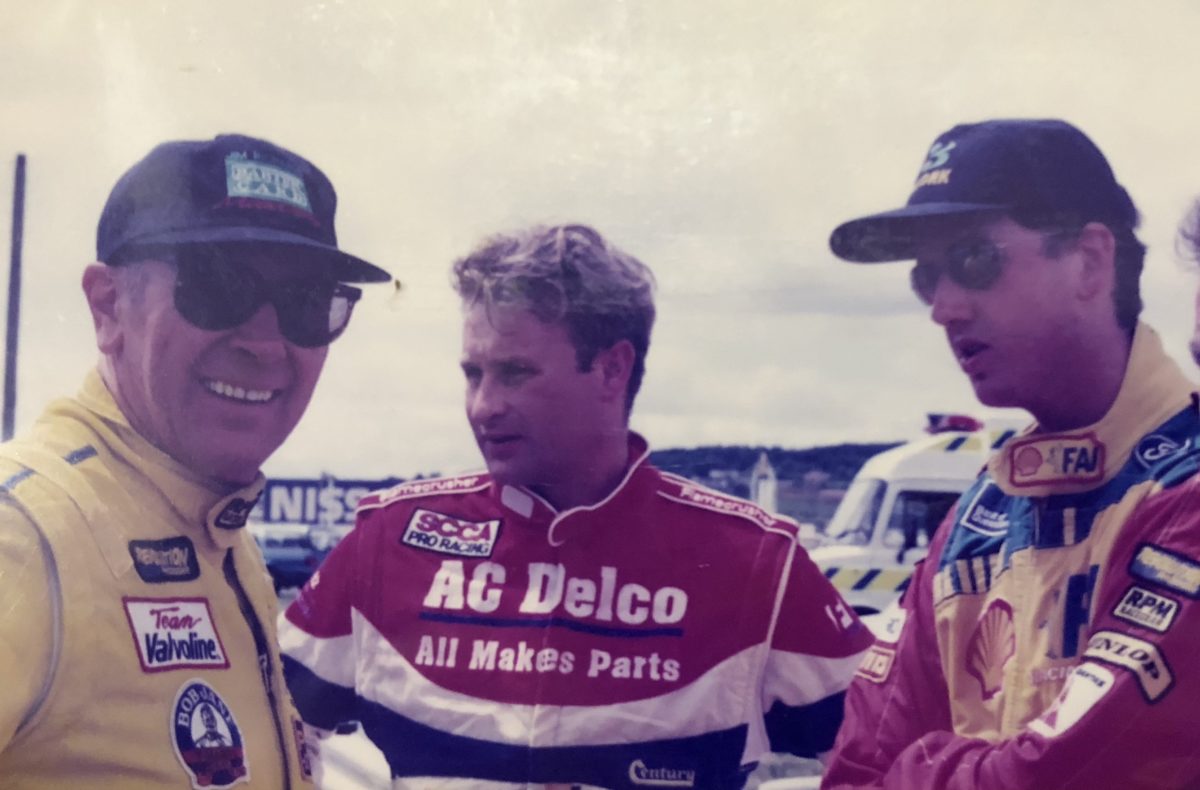
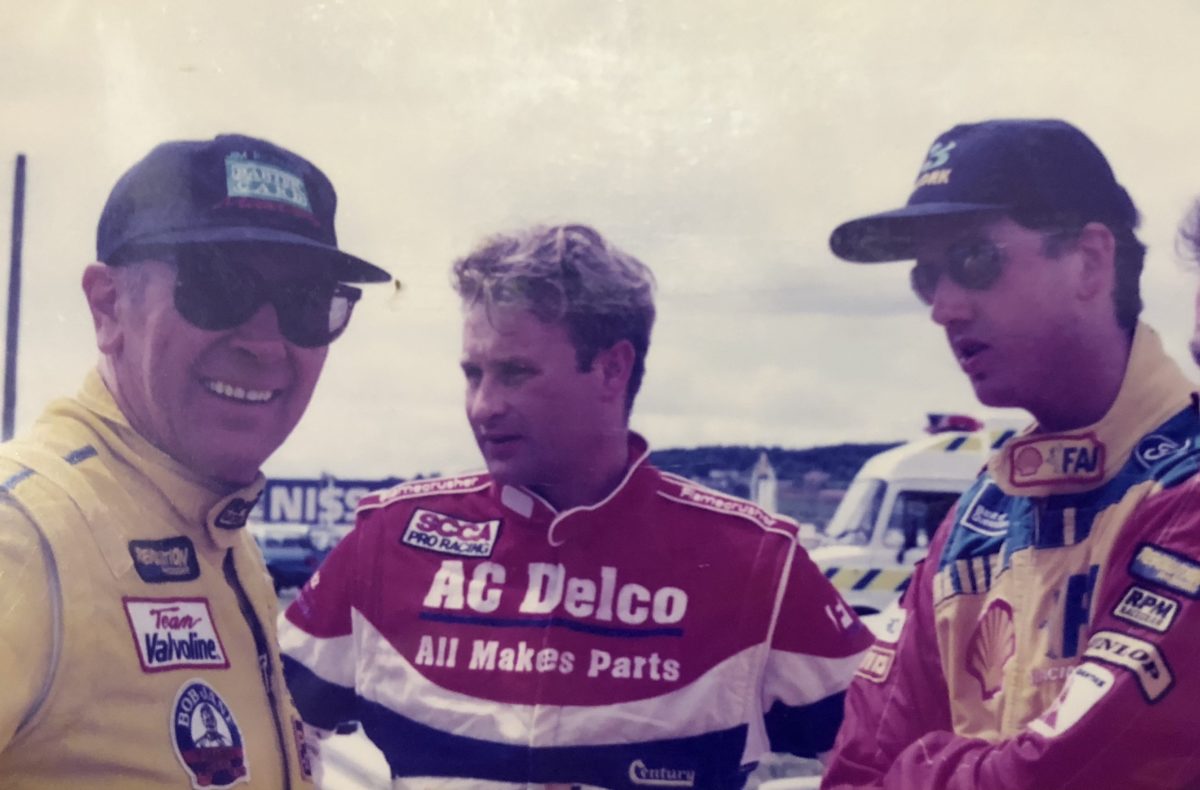
“One thing you’ll learn about McElreas; they love talking about themselves,” Andy McElrea joked to Speedcafe.com.
That comment came at the end of a conversation detailing a career in which he’s won championships as a driver and team owner, sold furniture, and developed a reputation as one of the best talent scouts in industry.
The amicable Kiwi today heads a powerhouse team which has nursed the formative careers of drivers like Warren Luff, Matt Campbell, and Jaxon Evans.
And while he’s played a remarkable role in countless careers, his own rise to the top of Australian motorsport is no less remarkable.
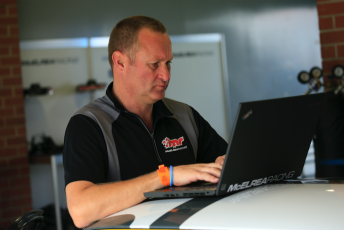
McElrea grew up in New Zealand where he came from two generations of racers; his father competed and so too his grandmother.
“Dad was a pretty big fish in a little pond, where we grew up in Ashburton,” McElrea stated.
“He was a bit of a local legend and lurker all wrapped into one.
“There’s no question that my interest came from spending every weekend in Dad’s workshop helping him, or at a racetrack watching, but even prior to that, my grandmother raced as well.
“She was one of the founding members of the Ashburton Car Club,” he added.
“So, she’s been a massive supporter of Dad’s and mine, and now Hunter’s (son), until she shuffled off a couple of years ago. That’s where it really started.”
McElrea grew up at the race track, collecting discarded bottles and exchanging them for sweets at the circuit canteens.
It was during those early years he met Tim Miles (who was initially more interested in McElrea’s sister), who has remained a lifelong friend and, in recent years, client to his eponymous team.
During high school, McElrea’s little gang had expanded to include Miles, John Evans (father of Jaxon) and Paul Cruickshank.
“Somewhere in high school we met, we all realised that we were like-minded,” McElrea recounted.
“So Paul, Johnny Evans, and myself were in the same year and Tim was the year behind us, but acting like he was a year ahead of us, which hasn’t changed.
“We were inseparable watching Formula 1 reruns and things at our family home, that was how we spent most of our teenage years.”
Though his father raced, McElrea’s own racing career was more of a slow burn.
Initially he competed in club events with his band of mates, taking part in dozens of “shingle sprints”, autocrosses and hill climbs.
His first car was an Austin A30, purchased with the proceeds from the sale of his 10-speed bike before upgrading to a Vauxhall Viva.
“Then I got a homemade sports car for about $2500 and that was when I started doing proper car club events and more speed related stuff.”
At the age of 18, McElrea stepped into a Formula Ford for the first time, on the recommendation of his father.
“He believed that it was the car that you needed to be able to master to be any good at the sport, so we got a ’75 Van Diemen and I got to do the National Ford Championship in 1985.
“That was fantastic to learn all the tracks, but I got last in every race.
“Then the following year I must have shown enough promise, so we bought an ’84 Reynard, that had won the ’85 championship. I ran that in the ’86 championship.”
It was in that car McElrea claimed his first win, at Bay Park in 1986, ending the season third in the championship.
“That was just before Scott Dixon came on the scene, so I was in my late teens, he was in his very early teens.”
During that period his path crossed with others, including Craig Baird.
“I taught him how to drink and the rest is history,” McElrea said.
McElrea left school on the second day of what would have been his penultimate year to start an apprenticeship with Allenton Motors.
“The foreman in the workshop was a guy who I knew through the Ashburton Car Club, Murray Cairns, and I wanted to work for him.
“I just kept going and asking him the year before if they had a job, they kept telling me to come back in three months.
“I kept coming back every three months and finally they said they had a job for me.
“I was an absolutely shit mechanic in those days. I was hopeless,” he admitted.
“I loved it, and I knew I needed to be a mechanic so I could work on my race cars, it was just a necessity.
“The poor buggers that hired me, the amount of engines that they had to pull down again and re-do after I’d had a crack at them was embarrassing.
“As a race mechanic I was pretty good, because it’s where my interests lay, (but) as a roadside mechanic I was crap.
“I had no passion for road cars but I did it because it was part of the job.”
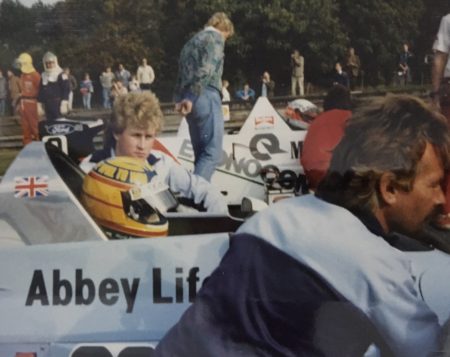
Following his third place in the 1986 New Zealand Formula Ford Championship, McElrea’s racing career came to an abrupt end, but not before heading to the United Kingdom.
“I went over to help Craig Coleman who had just won the National Championship in New Zealand,” McElrea said.
“He was doing the festival and the Race of Champions, that was in ’86.
“That’s when I met Dick Bennetts, who was also an old friend of Dad’s.
“We worked out of West Surrey Racing workshop for three months while he did his Formula Ford races, getting ready for the Race of Champions.
“At the very last minute, I obviously hadn’t raced for a while, my uncle who is a bit of a wheeler dealer type chap managed to get me into the International Race of Champions, against the champions all around the world.
“This is five years before I was good enough to win a championship.
“I ended up as a reserve and Craig Coleman was representing New Zealand, so I was representing the South Island of New Zealand because he convinced them that the South Island was a new country.”
From there, McElrea worked with Mark Blundell as the number two mechanic on his Formula Ford 2000 car.
“We managed to win the European Championship and we were second in the British.”
By this time McElrea’s own racing career had been parked.
“We ran out of money, so we stopped,” he admitted.
“We missed a year then we got to drive with Graeme Lawrence, to do the Formula Atlantic Championship, the summer series, which was in an absolute shitbox of a car.
“It had a nice paint job but it was an absolute dunger.”
He was helped during that year by Cruickshank, who described the car as “the very fourth car in a four car team”.
“We had a couple of races where it hung together almost to the end of the race,” McElrea said.
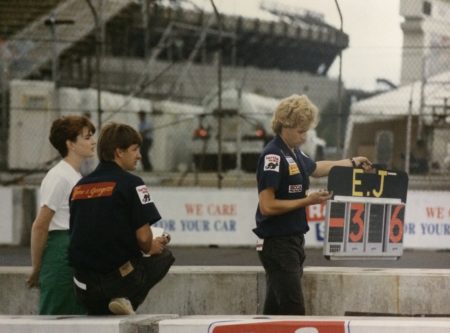
“After I drove the Atlantic car in ’88 summer series I went to America and tried to find a way to get involved there.
“I worked for a couple of days at the Swift Atlantic Factory.
“I was putting in little windscreens on the front of the tubs and then I went to Long Beach for the IndyCar race and met a team that was based in Chicago, which I thought was based in California.
“I joined the team, we did the race at Long Beach in SuperVee.
“So we headed off to the next race in Dallas, we were driving for a couple of days with the race in Dallas.
“That was really cool, I thoroughly enjoyed it.
“Then we hopped in the truck again, I thought we’d be back in LA in a couple of days. It was a bit longer on the road and I said to my boss, Pete, ‘When are we back in LA?’
“And he said, ‘What do you mean?’ And I said, ‘Well, isn’t that where we’re going?’ He goes, ‘No, no, we’re based in Chicago’.
“I should have asked the question probably, so I lived in Chicago for the year in ’88.”
With SuperVee supporting IndyCar, McElrea soon began making contacts which, more than 30 years later, he’s rekindling as his own son, Hunter, embarks on his own career.
After that season McElrea, returned to Christchurch where he started selling cars, watching on as friends like Greg Murphy, Baird and Paul Radisich continued to compete.
While working for a friend of his, Grant Milligan, that the opportunity to compete once again presented itself.
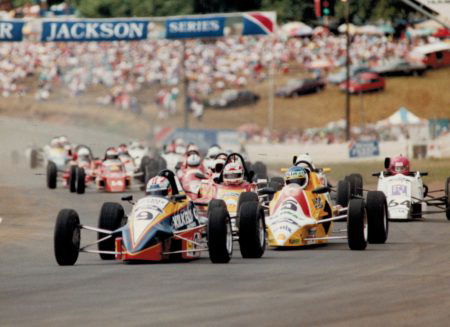
“At the last minute my boss gave me a 1986 Van Diemen, and I got to do that championship out of the blue,” he remembered.
That saw him net fourth in the championship before getting to drive the ‘88 Van Diemen the following year.
“We dominated,” he said.
“There were four championships that year, there was the Nissan Mobil series, which was the Wellington street race and Pukekohe, we won that.
“Then we did some South Island rounds before the national championship and a couple after, and we won that.
“Then the Peter Jackson Series, the international part of the championship which was five rounds. We managed to win that.
“Most importantly was the National Formula Ford Championship, which took in parts of all those championships.
“I was finally happy that I’d done what I believed I was born to do.
“That was the biggest moment of my life, winning that.”
After that success the carpet was pulled from McElrea as his boss restructured his business and he didn’t drive again for three years.
Then he got a job with Mark Petch in Auckland where he fell into driving a Camaro in the national Trans Am Championship.
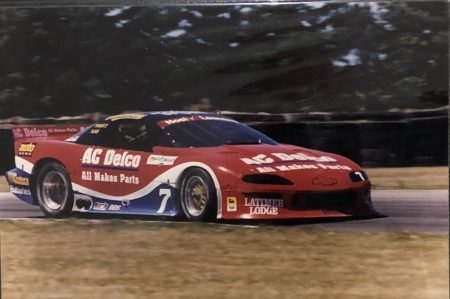
That was a deal that came about because a last minute driver change fell through.
“I was standing there and literally got thrown the keys less than a month before the championship started,” McElrea said.
“I managed to get second that year, in ’95, and then they built the new Camaro for ’96.
“That championship had Brock, Richards, Stevie Johnson, Paul Gentilozzi from America.
“Jim Richards and I were even on points, going into the last round at Timaru, which was my old home track.
“We managed to win all three races, so I beat my hero in a Trans-Am car. So that was a pretty cool time.”
Following that championship success he was encouraged by both Peter Brock and Jim Richards to head across to Australia.
At the same time he was also approached by Steve Millen, who had by then established himself in the US.
“He’d been my teammate in ’95 said, ‘If you come to America I will help you with a green card. You can work for me, helping me run one of the divisions in the Stillen Organisation. I’ll try and help you to drive, make some introductions, and you can take it from there’.
“So I thought, ‘Shit, he’s earning millions of dollars, the guys in Australia are earning hundreds of thousands, I’ll just take the plunge and go to America instead’.
“We ended up spending six years in America, in southern California, which was a lot of fun.
“We got married while we were there; we hit all sorts of milestones, like buying our first house and buying a new car, and having a kid – he’s a lucky little turd, now that he has an American passport, so that makes life very easy for him, with what he’s trying to achieve.”
McElrea finally headed home at the end of 2001, joining an IT business run by Miles out of Sydney.
“Tim gave me a job helping him with a business that he had started, working in a high rise building with PAs, and bowls of Minties everywhere,” McElrea said.
“It’s all very flash, but it just wasn’t me.”
While on a work trip in that role McElrea discovered the Gold Coast as a result of staying with Baird.
Reminded of Southern California, he soon moved his family north and set out to run his own business.
He began importing furniture leather from New Zealand, classic cars from Hong Kong, and even owned a furniture retail store with Baird.
By this stage his path had crossed that of Tomas Mezera, and he was working with the Porsche Driving School alongside importing timber furniture from Vietnam.
“Then Paul (Cruickshank) rang one day and said, ‘I’ve got a guy, Steve Webb, wants me to run his son Jono in a Porsche, but I’m busy with my V8 stuff. Do you want to look after it?’
“I only had five other things going on at the time so I said, ‘Sure, that’s a great idea, let’s do that.’”
That was the start of McElrea’s time with Paul Cruickshank Racing, which would see him run the Porsche side of the operation and ultimately get involved with the V8 Supercars team’s marketing in latter years.
“Then Paul shut his team down, so I took the Porsche toolbox and some scales and things and come in and set up our thing here over here,” McElrea admitted.
“It was never the intention but I thought, ‘You have to get a real job and you can’t keep playing with racing cars your whole life’, but it turns out I was wrong.”
Having kicked the furniture store to the kerb and with that side of the business slowly shrinking, McElrea made the decision in 2010 to ditch that side of the business altogether.
However, just as McElrea Racing was getting to its feet for 2009 Carrera Cup in Australia fell over.
Luckily for McElrea, Ross Stone picked up the phone and offered him the opportunity to run a Development Series (now Super2) car.
“He goes, ‘I’ve got a driver called Daniel Gaunt. He’s a Kiwi, he’s got some sponsorship. We’ve got a BF Falcon and a motor and spare driveshaft, So if you want to do the Development Series have a think about it and let me know.”
Within 24 hours the deal was done and McElrea Racing has continued to this day, but not without a few missteps along the way.
“I took some massively stupid financial punts in the first years,” he admitted.
“I’m still paying some of the debt off, that I incurred by trying to start with a hiss and a roar.
“It looked like one of the best teams around, but we really weren’t, we were new with a whole bunch of enthusiasm.
“The key for me was when I hired Leigh Geyer and Daniel Deighton, that gave us the actual technical and mechanical firepower to match my ambition.
“I didn’t go about it in a very intelligent way, I spent money that I didn’t have to because I wanted good drivers.”
The risk however paid off, and McElrea Racing is now one of the most successful national level motorsport teams in the country.
It’s also seen McElrea move on from his days of spinning the tools himself into a management role.
“When I was running the Porsche team at PCR, I was everything, as they say chief, cook, and bottle washer,” he explained.
“I was doing the deals, writing up my bush lawyer contracts with customers, filling the fuel cans, changing the tyres on the rims, cleaning them, polishing the cars, doing everything but the mechanical work, because you need to be focused and things had moved on a bit since I’d last done anything on a racing car in 1988.
“When I started my own team it was the same again. I did everything that I could except for the mechanical stuff.
“When Leigh came onboard he took over all the engineering side of it (and) I settled more into the management stuff.
“Then, as we kept growing, I actually started spreading my wings business-wise.
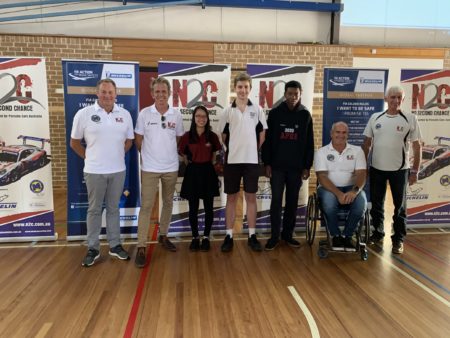
“One of the best things that we did was start the No Second Chance Program, and then we started MR Tuning, a retail business that sits beside the race shop.
“I’ve kind of stepped, not away from the race team, but I let Leigh run it on a daily basis and he’s done a fabulous job of that; I’ve just kind of been looking after the customer relationships.
“The part I really love is working with the drivers and trying to get inside their heads and build them up when they’re lacking a bit of confidence, or knock them back a peg if they’re overconfident.”
In recent years McElrea has developed a reputation as something of a driver whisperer; a man able to get inside the head of his drivers and extract their best.
He guided Matt Campbell through the early phases of his career before dropping him off on Porsche’s doorstep where he’s now a fully fledged factory driver.
With Jaxon Evans, the son of his old school mate, he’s achieved a similar feat.
McElrea’s own son, Hunter, won the Australian Formula Ford title in 2018 and is embarking on his own racing career – the fourth generation of McElrea to compete in the sport.
That saw the unique scenario of McElrea and Mick Ritter, the man behind Sonic Motor Racing Services, working together.
Like McElrea, Ritter has a strong reputation for being able to extract the very best out of talented youngsters.
“I was racing Dad at Sonic for two seasons,” McElrea explained.
“I got to see how Mick and Maria (Ritter) would do it, and it’s very much a family atmosphere, like what we have.
“Mick is famous for being grumpy and yelling at his drivers, and I’ve seen it.
“He is more of a psychologist than he will ever realise.
“He can push a kid to the breaking point, and then throw his arm around them when they need it, and get the best out of them.
“I’ve seen him do that with my own kid, so I know how it works.
“Ours (approach) is quite different,” he added.
“We growl at them without yelling.
“I’m all about the driver’s confidence, and even if they’ve screwed up, we talk about it in a different way than other teams would.”
With such a varied career, picking a highlight is difficult.
It was a question posed to him by Miles following the success of Matt Campbell, who won the Porsche Carrera Cup Australia title with McElrea Racing in 2016.

“Tim Miles rang and said, ‘Hey, is that more satisfying than winning your Formula Ford or Trans-Am Championship?’
“I’m like, ‘Shit, I actually hadn’t stopped to consider that’.
“Now that I can reflect I can say that Matt’s championship, Jaxon’s championship, and my two championships, I consider them all the same.
“I’m very, very proud of all of them, but I think I’m most proud of Hunter’s.
“He had this chip on his shoulder through his early years, and I must say it was my fault because I’d gee him up all the time that I’d won two championships and he’d won none.
“So he put more pressure on himself than he needed to, but when he won his Formula Ford Championship, that probably is my proudest one.”
In October 2017 three generations of McElrea’s shared a Toyota 86 at Levels (Timaru) in New Zealand, taking third in class.
Away from racing McElrea remains married, with his second son Cooper, 17, more interested in basketball than motorsport.
“To have two kids with completely and utterly different interests, but both doing their own thing is pretty neat.
“I’m not a particularly religious person, but I do feel I’ve been very blessed to get to this point.
“It hasn’t been without its moments, but yeah, I’m very happy with where we’re at.”





















Discussion about this post